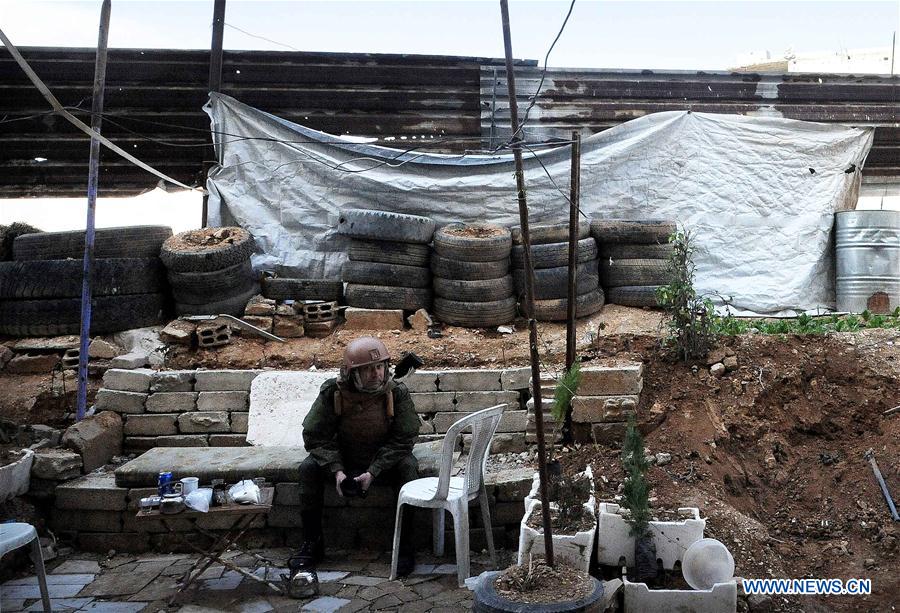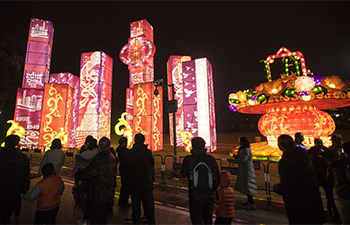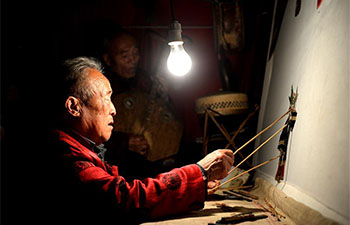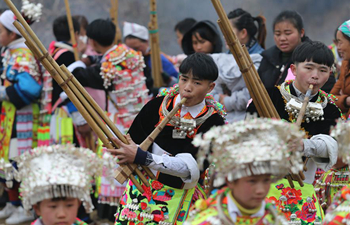 ?
?A Syrian soldier sits near a designated point to evacuate civilians from the capital Damascus' Eastern Ghouta, Syria, on March 1, 2018. The Russia-proposed humanitarian pause in the capital Damascus' Eastern Ghouta and the 30-day-long cessation of hostilities adopted by the UN Security Council recently have made no breakthrough in terms of completely ending the violence. (Xinhua/Ammar Safarjalani)
DAMASCUS, March 1 (Xinhua) -- The Russia-proposed humanitarian pause in the capital Damascus' Eastern Ghouta and the 30-day-long cessation of hostilities adopted by the UN Security Council recently have made no breakthrough in terms of completely ending the violence.
The daily humanitarian pause in the rebel-held Eastern Ghouta countryside of Damascus has so far failed to achieve its intended goal, in terms of the evacuation of civilians from that key hotspot as well as the entry of humanitarian aid to around 400,000 people there.
As in the past two days, the third day of the humanitarian pause on Thursday has seen no civilians leaving Eastern Ghouta or aid entering that area, which bodes ill for the UN Security Council resolution that was adopted on Feb. 24.
Two civilians have left on the second day only - a Pakistani man and his wife, who left Eastern Ghouta to the Pakistani embassy in Damascus after communications between the concerned parties.
Other than that, nothing has happened except for a brief lull during the day, more specifically between 9 a.m. (0700 GMT) until 2 p.m., since the Russia-proposed humanitarian pause went into force on Tuesday.
Both the government and the rebels in Eastern Ghouta are trading accusations.
The government says the rebels are not abiding by the ceasefire.
The UN Security Council adopted Resolution 2401 on Feb. 24, which requires all parties in Syria to immediately cease clashes and provides a sustained humanitarian break for at least 30 days across Syria.
And two days later, the Russians demanded a daily humanitarian pause for five hours in Eastern Ghouta specifically.
But all those initiatives have slightly reduced the number of rebels' mortar shells on the capital and the Syrian airstrikes and bombardment of Eastern Ghouta.
State news agency SANA said five people were wounded on Thursday when mortar shells struck areas in the capital.
The people in the capital are still preferring to stay indoors, particularly in the eastern Damascus' neighborhoods close to Eastern Ghouta.
Meanwhile, the Syrian Observatory for Human Rights said nine people were killed on Thursday by renewed bombardment on Eastern Ghouta, placing the number of the people who have been killed in Eastern Ghouta since the military showdown flared nearly two weeks ago at 611.
The state-run Ekhbaria TV said the rebels of Islam Army prevented 300 people from leaving Eastern Ghouta through a humanitarian corridor in the Wafidin area northeast of Damascus.
Ambulances and busses have been waiting for three days at the Wafidin crossing for any civilian to leave, but it hasn't happened yet.
The rebels have been claiming that the evacuation of civilians is not part of the UN Security Council resolution, demanding the entry of aid to that area instead.
In a trip to a shelter in the Dweir area in Damascus countryside, Xinhua reporters have been informed about the preparations that have been done by the government in cooperation with Russia, in terms of setting up clinics to treat the sick people and rooms for the families as well as classrooms for children to continue their education.
Maher Ihsan, a political expert, told Xinhua that both the UN resolution and the Russia-backed humanitarian pause have so far succeeded to slightly reduce the violence, adding that once the five-hour pause is done, mortar shells slam Damascus and the bombardment continue on Eastern Ghouta.
But in terms of any breakthrough, "it's highly unlikely," he said.
For the government, liberating the Eastern Ghouta from the rebels seems to be a priority now that the Syrian army has cleared major Syria areas from the insurgency.
The most workable solution for the government forces, is either the rebels' surrender or the civilian evacuation to carry out the anticipated ground assault on Eastern Ghouta, which constitutes the last threat to the capital Damascus after the Syrian forces with the help of the Russians and the Iranian-backed militias secured the southern, western and northern flanks of the city.
But the most plausible solution is the rebels' departure, observers believe, as a wide-scale military operation into that densely-populated area could result in hefty losses for the civilians.
The planned military operation primarily aims at eliminating the al-Qaida-linked groups, which are excluded from any ceasefire. But even other rebel groups are seen by the government forces as terrorists, with recent reports on the state-run media outlets accusing the Saudi-backed Islam Army of preventing the civilians evacuation and targeting the Wafidin area with mortars.
It's a complicated scenario in Eastern Ghouta due to the political and military support to some rebel groups, and the high number of civilians in that area.
The UN resolution and the Russian humanitarian pause seems to be slowing down the military showdown, but not stopping it.
On Thursday, Britain formally asked the United Nations Human Rights Council to hold an "urgent debate" this week on the situation in Eastern Ghouta.















